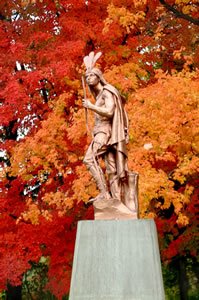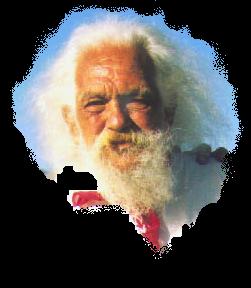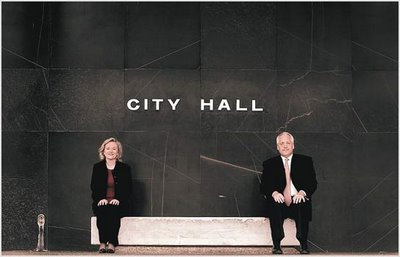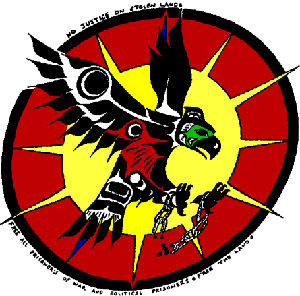| Welcome to Infoshop News Tuesday, April 11 2006 @ 02:19 PM PDT |
Nearly a million protest for immigrants around the U.S. | |||
| |||
Our Universe expands and contracts like tides on a beach while we hunger, sense, sleep, search; Exchanging Symbols on a hunk of blue shining bright through the cosmos from water, air and sun but named Earth for the dirt we cling to... while waves wash worlds.

| Welcome to Infoshop News Tuesday, April 11 2006 @ 02:19 PM PDT |
Nearly a million protest for immigrants around the U.S. | |||
| |||








Anthony Olszewski
Copyright 2003
A group of Marion and Greenville area residents publicly stated that they are directly descended from Native Americans. Specifically, they trace their lineage to a branch of the Lene Lenape tribe long thought to have been wiped out by Dutch settlers.
Chief Abraham "Fox-that-walks" Petz, owner of "Honest Abe's Pawnshop and Beeper Reconnection Service", says that the tribe has kept it existence secret to this day due to a fear of violence from "colonists and other newcomers." His brother, Martin Samuel Petz, notorious for his part in the Robert Vesco LSD for Alaskan Land deal, declined comment. Tribal Medicine Man, Leroy "Bear-that-stares" Smith would only say that Martin Samuel Petz is no longer a member of the tribe.
Leader of the Tribal Council, Salvatore "Crab-that-swims" Serratte, retired Business Agent of Teamster's Local 560, elaborated on the group's application to open a casino. "Given all the hardship and privation that we was forced to suffer, it's only right that some allowance be made." Salvatore Serratte is featured in another story today. (See below.) The tribe believes that their casino will eventually become "the crown jewel" in a massive recreational complex on the Jersey City waterfront. In their opinion, "this translates into prosperity for all residents of Jersey City."
Chief Petz, pointed to a boulder jutting out from the sidewalk in front of his shop. "That stone has been sacred to our tribe from time immemorial." An elderly neighborhood resident wondered aloud, "But Abe, I remember when your grand-daddy told the contractor that, since he wasn't going to pay no extra to get it tugged out, that rock was just having have to go set there."
| |
| Activists Push Back at NYPD Rescuing Protest Before Bush '04 by Chisun Lee July 2 - 8, 2003 |
And while he won't divulge specifics, police spokesperson Michael Collins says plans are forming more than a year in advance to ensure "the highest levels of security this city has ever seen" when President George W. Bush arrives to be renominated in September 2004.
For the NYPD, in concert with the Secret Service and a slew of federal agencies, maintaining order will be a daunting challenge, and not just because of the obvious terrorism concerns. The Bush administration's policies have roused hundreds of thousands of New Yorkers to some of the most heated agitation the city has seen in decades.
Angry protesters have claimed police are meeting these demonstrations with new heights of repressiveness, amounting to a pattern of unfounded arrests and abuses. Now, with an eye to the near future, they are pushing back. A look at the activist scene today reveals a number of challenges that together form a multipronged effort to free the streets. New Yorkers want their right to protest to be as firmly entrenched as the police presence will be come 2004.
Fifteen activists were set to file a federal lawsuit July 1 claiming the NYPD trampled on their civil liberties at the massive February 15 anti-war demonstration near the United Nations. Accusing police of interference and abuse—including arbitrary arrests and blocked access to the rally—the complaint will seek damages and a declaration that police violated the constitutional rights of a potentially huge class of participants from the year's biggest protest.
The ranks of the wronged could include "everybody who was denied access to the demonstration site that day because police were blocking off the streets," says William Goodman, former legal director of the Center for Constitutional Rights, who represents the plaintiffs along with police brutality lawyer Jonathan Moore.
Police refused to issue a permit for a march past the UN, citing security concerns, and instead approved a stationary rally, ultimately located at 51st Street and First Avenue. But to get there, an estimated 100,000 to 400,000 people, of all ages and backgrounds, packed First, Second, and Third avenues, inching along in the frigid cold for hours. Cops wearing riot gear, at metal barricades, in the crowd, and on horseback, tried to shift bodies en masse, mostly away from the side streets. A great many who showed up that day complained of being unable to reach the rally site. Some 300 were arrested.
At minimum, Goodman argues, police robbed legions of their rights to assemble and express their views—through decisions ranging from the denial of the march permit to the handling of the crowds.
Then there are the folks like plaintiff Sara Parkel, a 31-year-old freelance artist from Brooklyn, who was arrested and held overnight, although, she says, "I wasn't doing anything wrong."
"I was always under the assumption that you would be arrested if you did something wrong, like threw a rock," says Parkel. "I wasn't even in the street." Knowing protesters were supposed to stay on the sidewalks, she says she was among the minority who managed to do so. But on a sidewalk on West 39th Street, "I was trapped," she says, when a small army of police pressed the throng around her against a building and began making arrests.
Parkel was locked up with 13 other women in the back of a paddy wagon for approximately four hours, she says. "People were peeing in the back of the truck," because "overloaded" police ignored their pleas to use the bathroom. They also ignored her three or four requests to use the phone once at the Seventh Precinct, where she was held overnight. "Around 1:30 or two in the morning, they called us all in individually," she says, to question the arrestees about their political affiliations and views. "I grew up knowing you're supposed to be read your rights, which we weren't, and you're supposed to be allowed one phone call, which we weren't."
None of the plaintiffs arrested that day was convicted. Says Goodman, "People were arrested in the hundreds, not as a method of legitimate law enforcement, but as crowd control."
The 40-page complaint mentions other wrongs, including people being injured by police horses, manhandled by cops, and denied food and water for many hours. Similar charges appear in a New York Civil Liberties Union report based on a much larger number of complaints from that day, over 300. NYCLU executive director Donna Lieberman knows of about 35 charges from that day that were dropped outright.
Says Parkel, "The arrests were a tactic to discourage people who were talking out against our government." She signed on to the class action "to fight against intimidation." Goodman hopes the lawsuit will make the NYPD more protest-friendly by convention time. "If they get away with it once, they'll do it again," he says.
But police blame the disorder of February 15 on the rally's organizers. The NYPD's Collins says leaders failed to adequately inform people how to get to the protest site and provided too few marshals to manage the crowd. Police acted well within reason, says Collins. "Thousands and thousands of people were not arrested," he points out, when asked about the legitimacy of the several hundred arrests.
There is the possibility of another lawsuit by activists, however, which would accuse police of making questionable arrests to deal with demonstrators on yet another occasion.
On the morning of April 7, about 20 people purposely risked arrest by blocking the entrance to the midtown office of the Carlyle Group, a defense-industry investment firm with ties to the Bush administration, to dramatize their opposition to the war in Iraq. Across the street stood some 100 protesters who sought to support those engaging in civil disobedience through lawful means. According to a number of participants, those supporters kept to the sidewalk and left a path clear for pedestrians, as instructed by the First Amendment lawyers there to advise them.
Two of those lawyers told the Voice that a swarm of helmeted police—so many as to seem to outnumber the protesters—abruptly surrounded the group of supporters. Spurning the participants and lawyers, who said the crowd was willing to disperse, police reportedly would not let anyone leave and arrested approximately 80 people, ranging from teens to seniors.
Mark Milano, a longtime organizer with ACT UP/NY, the direct-action AIDS activist group, says, "One of the cops said it was really a preemptive strike, that they thought the people across the street might break the law."
Many charged on April 7 are too angry to take the administrative dismissals that are often offered to resolve minor disorderly conduct charges and vow to fight their cases in court. At least two have gone to trial so far and been acquitted. Center for Constitutional Rights staff attorney Nancy Chang says the organization is seriously considering a class action suit against the city, pending the resolution of all the cases. ;Still another battle to protect activists' rights targets the NYPD's use of its newly won power to investigate lawful political activity. ;After September 11, the department claimed it needed that power to root out potential terrorists, who might masquerade as law-abiding New Yorkers. In March 2003 a federal judge agreed to radically weaken a long-standing ban, known as the Handschu agreement, on police investigations of lawful, constitutionally protected activity—a remedy to the politically motivated FBI and police probes of the 1960s and 1970s. ;Since then, hundreds of arrestees from various protests have reported being quizzed, some under duress, on their political views and group memberships. In April, it was revealed that a police intelligence officer had created a "demonstration debriefing form" and computer database to compile such information. Public outcry led the NYPD to destroy the forms and database. But the scandal has prompted a team of civil rights lawyers to challenge the lifting of the old ban on political probes. "That change was based on concerns about investigating terrorism," says Martin Stolar, one of the attorneys. "Now we find out they used [the new powers] on low-level First Amendment protest." The lawyers, who won the original ban on political surveillance in 1985 in an activists' class action suit against the city, want internal police investigation guidelines to be made enforceable through the courts. Political questioning "takes us back to the days of the old Red Squad, where police are keeping dossiers on noncriminal citizens," says Stolar. "If people know they'll end up in a police file, they won't participate in demonstrations." A judge is expected to rule soon. ;Also pending are at least 70 individual grievances that protesters made this year to the Civilian Complaint Review Board, the independent agency that investigates NYPD misconduct. CCRB spokesperson Ray Patterson says the number of protest-related complaints is unusually high. With most, "excessive force was alleged, like use of horses." ;A handful of individuals have filed their own civil suits against the city on protest-related claims. The spate of complaints by activists may signal not necessarily that police tactics have become harsher, but that more people are being exposed to them. Unjustified arrests and rough treatment were always to be found at anti-police-brutality rallies and events like Harlem's Million Youth March, claims activist Wol-san Liem. She and some 80 members of a racially diverse group were arrested this May during three days of planned civil disobedience, dubbed Operation Homeland Resistance. In shifts, they blocked the entrance to 26 Federal Plaza, which houses immigration authorities, in an effort to highlight "the war at home" against the undocumented. "It's interesting to hear white, middle-class protesters talk about how unbelievable it is to them that they were not treated humanely. People of color daily deal with police brutality, and they resist it routinely—that's what the Diallo protests were about," she says. Indeed, the city's protester population has recently burgeoned with additions from across the political spectrum. The numbers promise a rowdier convention than the several Democratic gatherings the city has hosted in the past. "Back then, we were pretty laid-back," says Miami police chief John Timoney, who commanded NYPD operations during the 1992 Democratic convention. He notes that nothing like the September 11 attacks haunted police then, and the issues and the candidate were less controversial. There was no preemptive war on Iraq, no suspicions of political lies about weapons of mass destruction, and there was no great anxiety over losing civil liberties to a White House-led war on terrorism. The traditional convention-protest area, Eighth Avenue between 31st and 33rd streets, holds a maximum of about 5,000 bodies, says Timoney. Bush policies have propelled hundreds of thousands into city streets this year. "People are going to be as angry or angrier about the Bush administration as they are now. The fact that there is some possibility of getting rid of this guy will draw a lot of people," predicts Leslie Cagan, lead organizer of United for Peace and Justice. Accused by police of not planning its February 15 anti-war demonstration far enough in advance, UFPJ has already submitted two permit requests for a march and a rally during convention week. The NYCLU asked the police a month ago to begin negotiations for convention protest, says executive director Lieberman, and a meeting is expected as early as July. She says the NYPD's response to current criticism of its protest tactics is a key indicator. "The refusal to acknowledge mistakes will be the single biggest cause for pessimism as we move ahead." The mass arrests and political questioning have already had a chilling effect, according to some activists. Liem says immigrants, especially, find themselves weighing their desire to demonstrate against the risk of detention and even deportation, to themselves and, by association, family and friends. No one, says ACT UP/NY's Milano, should have to "be afraid just to come out to a street protest."
Disambiguation: you may also be looking for Oi Polloi, a punk group.
Hoi polloi (Greek: οι πολλοι), an expression meaning "the many" in Ancient Greek, is used in English to denote "the masses" or "the people", usually in a derogatory sense. For example, "I've secured a private box for the play so we don't have to watch the show with the hoi polloi."
The phrase originated in English in the early 1800s, a time when it was considered necessary to know Greek and Latin in order to appear well educated. The phrase was originally written in Greek letters. Knowledge of these languages would serve to set-apart the speaker from the common people who did not have that education.
The phrase has been the source of considerable controversy over its correct usage. One debate has been over the usage of the English article "the" in front of the phrase. Also, the phrase has at times been used to meet the exact opposite of its originally intended meaning.
It is interesting to note that when hoi polloi was used by writers who had actually been educated in Greek, it was invariably preceded by the. Perhaps writers such as Dryden and Byron understood that English and Greek are two different languages, and that, whatever its literal meaning in Greek, hoi does not mean "the" in English. There is, in fact, no such independent word as hoi in English — there is only the term hoi polloi, which functions not as two words but as one, the sense of which is basically "commoners" or "rabble." In idiomatic English, it is no more redundant to say "the hoi polloi" than it is to say "the rabble," and most writers who use the term continue to precede it with *the* ...[6]
New media and new inventions have also been described as being by or for the hoi polloi. Bob Garfield, co-host of NPR's On the Media program, 8 November 2005, used the phrase in reference to evolving practices in the media, especially Wikipedia, "The people in the encyclopedia business, I understand, tend to sniff at the wiki process as being the product of the mere hoi polloi."[23] The blog Isengard.gov referred to the $100 PC project as being for kids and the hoi polloi. The post went on to refer to the correct usage of the phrase, "*Although we at Isengard.gov are using the greek phrase hoi polloi in its correct meaning of "the common people," rather than the incorrect but more hoi-polloish meaning of "the hoity-toities," "the fancy-living types," the "ravenous blood-sucking leeches fattening their stomachs on the backs of the masses," or "THE ARISTOCRATS!," it does not, in and of itself, indicate that we are insufferable smarty-pants. That may be established by independent means."[24]
~~~~~~~~~~~~~~~~~~~~~~~~~~~~~~~~~~~~~~~~~~~~~~~~~~~~~~~~~~~~~~~~~~~~~~~~~
... Soy Hoi Polloi ~ el duderino


















